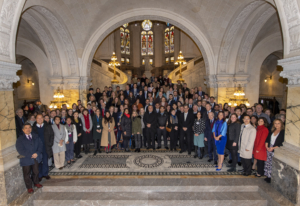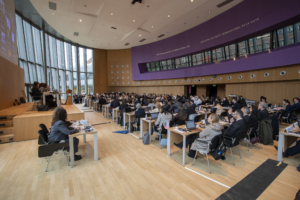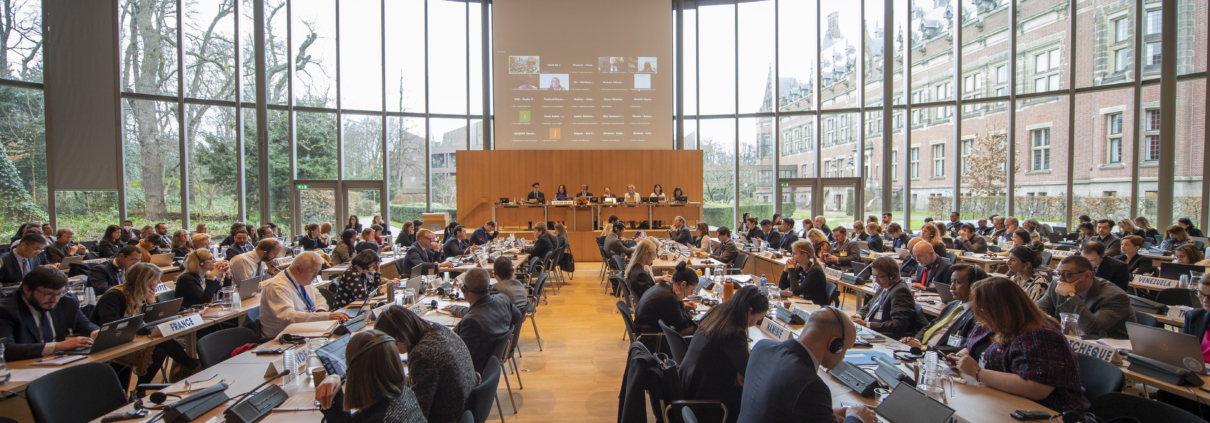Views
Proving Chinese Law: Deference to the Submissions from Chinese Government?
Written by Dr. Jie (Jeanne) Huang, Senior Lecturer, University of New South Wales Faculty of Law
The recent U.S. Supreme Court case, Animal Science Products, Inc. v. Hebei Welcome Pharmaceutical Co. Ltd, concerns what weight should be given to the Chinese government’s submission of Chinese law. On Page 58 of the trial transcript, Justices Kagan and Ginsburg asked how about other countries dealing with formal submissions from the Chinese government. There are two examples.
One is Hong Kong. In TNB Fuel Services SDN BHD v China National Coal Group Corporation ([2017] HKCFI 1016), the issue is whether the defendant, a state-owned enterprise, is protected by Chinese absolute sovereignty immunity under Chinese law. The court deferred to an official letter provided by the Hong Kong and Macao Affairs Office of the State Department in Mainland China. The Office answers no absolute sovereignty immunity to Chinese state-owned enterprises carrying out commercial activities. The Court adopted this opinion without second inquiry (para 14 of the judgment). After considering a bunch of other factors, the court ruled against the defendant.
The other is Singapore. In Sanum v. Laos ([2016] SGCA 57), the issue is whether the China-Laos Bilateral Investment Treaty (BIT) shall be applied to Macao Special Administrative Region. Chinese embassy in Laos and China Ministry of Foreign Affairs provided diplomatic announcements indicating that the BIT shall not be applied to Macao. However, the Court of Appeal of Singapore held that China’s announcements were inadmissible and, even if admitted, they did not change the applicability of the BIT to Macau. This is partly because, before the dispute with Sanum crystalized, no evidence showed that China and Laos had agreed that the BIT should not be applied to Macau. Therefore, the China’s diplomatic announcements should not be retroactively applied to a previous dispute. For a more detailed discussion, please see pages 16-20 of my article.
TNB Fuel Services and Sanum share important similarities with Animal Science Products, because the key issues are all about the proving of Chinese law. In the three cases, Chinese government all provided formal submissions to explain the meaning and the applicability of Chinese law. However, TNB Fuel Services and Sanum can also be distinguished from Animal Science Products, because comity plays no role in the former two cases. TNB Fuel Services concerns sovereign immunity, which is an issue that Hong Kong courts must follow China’s practices. This is established by Democratic Republic of the Congo v. FG Hemisphere Associates (FACV Nos. 5, 6 & 7 of 2010). Sanum is a case to set aside an investment arbitration award, so the Court of Appeal of Singapore need not consider comity between Singapore and China. In contrast, in Animal Science Products, the U.S. Court of Appeals for the Second Circuit elaborated the importance of comity between the U.S. and China. Therefore, Animal Science Products should not be considered as a technical case of proving foreign laws. The U.S. Supreme Court may consider deferring to the submissions of Chinese government to a certain extent but allows judges to decide whether the Chinese government’s submission is temporally consistent with its position on the relevant issue of Chinese law.
Who Owns France.com?

France is a state. France.com, by contrast, is a domain name, and it was, until recently, owned not by the French state but instead by a Californian company, France.com, Inc. That conflict is now being litigated in a fascinating dispute reminiscent of the early days of the internet.
In those early days, in 1994 to be precise, a French-born individual living in the United States, Jean-Noël Frydman, registered the domain name France.com. The domain name is now held by a Californian company, France.com Inc, which Frydman set up. The website, at first dedicated to general information for Francophiles around the world, was later expanded to operate as a travel site. But France.com, Inc, did not, it appears, own trademarks in Europe. This enabled a Dutch company, Traveland Resorts, to register French and European word and graphic marks for France.com in 2010. In 2014, France.com, Inc brought suit in France against Traveland for fraudulent filings of trademarks and achieved a settlement under which Traveland transferred the trademarks.
But that was a Pyrrhic victory. The French state and its own travel development agency, Atout, intervened in the litigation, claiming the trademarks for itself instead. Atout had been running, since 2010, its own information site, france.fr. French state and Atout were successful, first before the Tribunal de Grande Instance, Paris , and then, partly, on appeal before the Cour’ d’appel de Paris (English translation, note by Alison Bouakel) As a consequence, web.com transferred the domain in 2018. Now, France.com immediately directs to France.fr.
So far, the conflict is mostly a French affair. But Frydman is taking the litigation to the United States. France.com, Inc has brought suit in Federal Court in Virginia against the French State, Atout, and against Verisign, the authoritative domain registry of all .com addresses. The suit alleges cybersquatting, reverse domain hijacking, expropriating, trademark infringement, and federal unfair competition. US courts and WIPO panels have so far not looked favorably at foreign government’s claims for their own .com domain name; examples include PuertoRico.com, NewZealand.com, and Barcelona.com. Will the French State be more successful, given the French judgment in its favor?
Although neither the French courts nor the complaint in the United States address conflict of laws issues, the case is, of course, full of those. Are the French state and its travel agency protected by sovereign immunity? The Foreign Sovereign Immunities Act contains an exception for commercial activities and is limited to sovereign acts: Does ownership of a domain name constitute commercial activity? Surely, many of the activities of Atout do. Or is it linked to sovereignty? After all, France is the name of the country (though not, ironically, the official name.) The U.S. Court of Appeal for the Second Circuit left the question open in 2002 (Virtual Countries, Inc. v. South Africa, 300 F.3d 230).
Must the federal court recognize the French judgment? That question is reminiscent of the Yahoo litigation. Then, a French court ordered that Yahoo.com could not offer Nazi paraphernalia on its auction website. Yahoo brought a declaratory action in federal court against recognizability of the judgment in the United States. The affair created a lively debate on the limits of territorial reach in internet-related litigation, a debate that is still not fully resolved.
Relatedly, did the French state engage in illegal expropriation without compensation? Such acts of expropriation are in principle limited to the territory of the acting state, which could mean that the French state’s actions, if so qualified, would be without legal effect in the United States.
To what extent is US law applicable to a French trademark? By contrast, to what extent can the French trademark determine ownership of the domain? Trademarks are a perennially difficult topic in private international law, given their territorial limitations; they conflict in particular with the ubiquity of the internet.
Is the top level domain name – .com, as opposed to .fr – a relevant connecting factor in any of these matters? That was once considered a promising tool. But even if .fr could in some way link to France as owner, it is not clear that .com links to the United States, given that it has long been, effectively, a global top level domain. On the other hand, most governments do not own their own .com domain. And US courts have, in other cases (most famously concerning barcelona.com) not doubted applicability of US law.
A timeline with links to documents can be found at Frydman’s blog site.
The Supreme Court deals the death blow to US Human Rights Litigation
Written by Bastian Brunk, research assistant and doctoral student at the Institute for Comparative and Private International Law at the University of Freiburg (Germany)
On April 24, the Supreme Court of the United States released its decision in Jesner v Arab Bank (available here; see also the pre-decision analysis by Hannah Dittmers linked here and first thoughts after the decision of Amy Howe here) and, in a 5:4 majority vote, shut the door that it had left ajar in its Kiobel decision. Both cases are concerned with the question whether private corporations may be sued under the Alien Tort Statute (ATS). Read more
News
Issue 1 of Uniform Law Review for 2023
The HCCH this month published some recent developments on private international law in Issue 1 of Uniform Law Review for 2023 as “News from the Hague Conference on Private International Law (HCCH)”
Over the past year, the HCCH, supported by its Permanent Bureau, has continued its work for the progressive unification of the rules of private international law (PIL). This annual contribution to the Uniform Law Review provides an overview of the activities of the HCCH from 1 November 2021 to 30 November 2022 and anticipates some upcoming events, encompassing the HCCH’s three main areas of work: international family and child protection law, transnational litigation and apostille, and international commercial, digital, and financial law.
NGPIL Prize
Originally posted in News and events – Nigeria Group on Private International Law (ngpil.org)
On 4 March 2023, the Nigerian Group on Private International Law (“NGPIL”) colleagues were pleased to meet the winners of the 2023 NGPIL Conflict of Law’s Essay Prize. This year, we awarded two candidates, winner and first runner up, for excellent and engaging pieces on PIL and Nigeria.
Our winner, Oluwabusola Fagbemi, an LLM student from the University of Ibadan, Oyo State emerged as the winner of this year’s competition. She wrote on “A Comparative Analysis of Product Liability in the Conflict of Laws”, a piece that the deciding panel found to engage robust research, comprising of Nigeria common law, EU approach, English approach and US approach. Our winner was awarded 185,000NGN. In her words “It is an honour to be selected for The NGPIL Prize for the year 2022/2023. Thank you very much…It was also great to get to know them [NGPIL] and hear of their exciting work, and the impact that they are making in the PIL space globally… believe that The NGPIL is the right place for me to grow, learn, advance my career, and develop my interests in PIL. I will definitely keep in touch and remain connected, and I am looking forward to future collaboration.”
Adeyinka Adeoye from the Nigerian School of Law, Kano Campus received the 1st runner prize on her paper entitled “Product Liability in Private International Law” from a Nigerian perspective. She was awarded 65,000NGN. In her words “I am super excited that my essay emerged first runner-up. This news came at the best possible time“.
Huge congratulations to Busola and Adeyinka!
Conclusions & Decisions of the Council on General Affairs and Policy (CGAP) of the HCCH now available!
The Council on General Affairs and Policy (CGAP) of the HCCH met from 7 to 10 March 2023. The meeting was attended by over 450 participants, representing 80 HCCH Members, 8 non-Member States, 7 intergovernmental organizations, 9 international non-governmental organizations, and members of the Permanent Bureau. The Conclusions & Decisions adopted by CGAP are now available in English and French.
In terms of work relating to possible new legislative instruments, CGAP mandated the establishment of a Working Group on private international law (PIL) matters related to legal parentage generally, including legal parentage resulting from an international surrogacy arrangement. Noting progress made by the Working Group on matters related to jurisdiction in transnational civil or commercial litigation in the development of provisions for a draft Convention, CGAP invited the convening of two further Working Group meetings. It also supported further exploratory work on the PIL implications of the digital economy, including, among other, by mandating the conduct of a study on the PIL implications of CBDCs and by endorsing the launch of the HCCH-UNIDROIT Project on Law Applicable to Cross-Border Holdings and Transfers of Digital Assets and Tokens. Across several projects, CGAP welcomed the cooperation with UNCITRAL, UNIDROIT, and WIPO, including with respect to work in the areas of digital economy, insolvency proceedings and intellectual property.
In relation to post-Convention work, CGAP approved the Toolkit to Prevent and Address Illicit Practices on Intercountry Adoption and the Model Forms for use under the 1993 Adoption Convention, mandated the development of a Template for Country Fact Sheets on available post-adoption services relating to search for origins, and mandated the establishment of a Working Group on financial aspects of intercountry adoption. CGAP also agreed upon the extension of the scope of the International Hague Network of Judges (IHNJ) to matters relating to the 2000 Protection of Adults Convention. CGAP endorsed the Conclusions & Recommendations of the recent meetings of the Special Commissions (SCs) on the practical operation of the 1993 Adoption, 2000 Protection of Adults, and 2007 Child Support Conventions, and welcomed the preparations for the upcoming meetings of the SCs on the practical operation of the 1980 Child Abduction and 1996 Child Protection Conventions, to be held in the second half of 2023, and on the practical operation of the 1965 Service, 1970 Evidence and 1980 Access to Justice Conventions. Finally, CGAP mandated the PB to continue work, in partnership with relevant subject-matter experts, and subject to available resources, to study the 2006 Securities Convention and digital developments in respect of securities markets; the interpretation of analogous institutions for the purpose of Article 2 of the 1985 Trusts Convention; and, in relation to the 2015 Choice of Law Principles, the feasibility, desirability and necessity of developing guidance on applicable law in international contracts providing protection to weaker parties.
From a good governance perspective, CGAP approved the HCCH Strategic Plan for 2023-2028. It also decided to adopt Spanish as an official language of the HCCH as of 1 July 2024. Finally, CGAP decided to recommend Dr Christophe Bernasconi to the Netherlands Standing Government Committee on Private International Law for the position of Secretary General of the HCCH for another five-year mandate.





